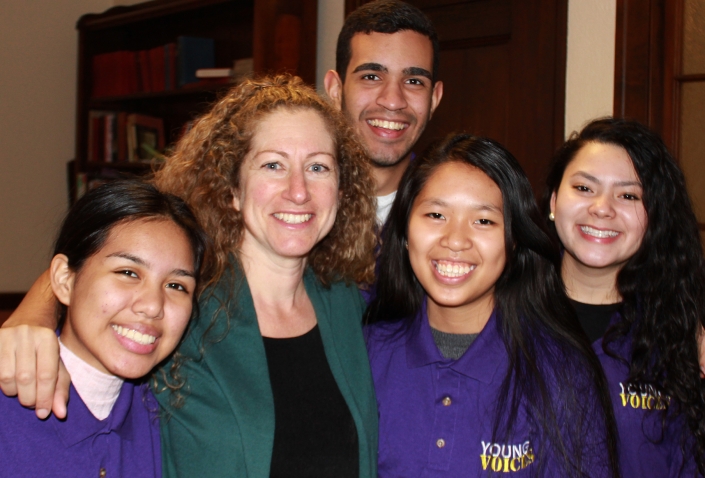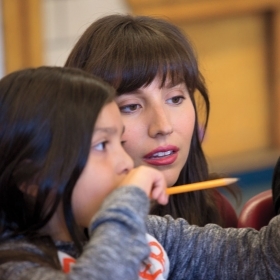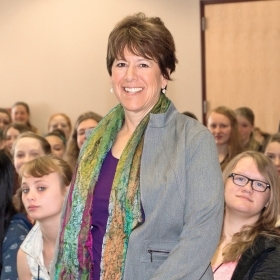Karen Feldman ’89 knows a few things. One: Working with low-income youth is her calling. Two: The conventional wisdom that low-income students cannot compete with the best in their age group is simply not true. “What I know for sure from 25 years of doing this work is that when young people are given opportunities that are effective to learn and grow, they will succeed beyond anyone’s expectations, including their own,” she says.
Karen has made a career out of helping young people find their way in the world since graduating from the Kennedy School of Government in 1993. Ten years ago, she founded Young Voices, a Rhode Island-based nonprofit dedicated to giving urban youth a say in policy-making and turning them into leaders and advocates.
Young Voices is not your average after-school program for urban youth. Students regularly testify before the state legislature. They meet with corporate CEOs. They advise the superintendent of Providence schools on a monthly basis. “They’re regularly meeting with people who are in power and learning how to advocate in productive and effective ways,” Karen says. The organization works in four Providence high schools as well as one large community site that serves all the area high schools. “These are low-income youth coming from the worst-performing high schools in the state of Rhode Island,” she says.
But with the help of Young Voices, they are outperforming their peers—and expectations. Last year, 100 percent of the roughly 180 students who went through the program, graduated from high school. In the school districts these students attend, the average graduation rate is just 67 percent, according to Karen. In addition to this, 100 percent of the program’s participants were accepted into four-year colleges last year. “Not only do they get into college, but they have the skills and the tenacity to graduate from college on time,” she says, something that many low-income and first-generation college students struggle with.
Karen credits the program’s emphasis on leadership and advocacy as key to helping them succeed. “We are strategically teaching them the things you cannot learn in schools,” she says. “We’re teaching networking skills, how to work a room, how to talk with people in power, how to advocate, communication skills.” The program is open to all students in grades 9 to 12, and participants come two to three times a week year-round. Often students are immigrants with poor English skills, so that’s often one of the first things they work on. “They come super rough around the edges, because no one has invested in them,” Karen says. “[Young Voices] is an in-depth investment in each young person.”
And those investments have paid off. “One of my greatest joys is I’ve had two of my former youths work at the White House,” Karen says. “I had a piece in them getting to that level, and they’re making a level of change for this country that I could never imagine.”
As the nonprofit continues to help Rhode Island youth, Karen’s got her sights set on expanding the impact of the program. She’s already created a training module that would help other communities establish the program, but she’s still searching for the resources and time necessary to make it happen. “I’m utterly committed that all young people, especially low-income youths of color, are able to achieve everything they dream of,” Karen says. “I face obstacles all the time, but I’m not going to let these young people down. I’m going to find a way.”








We ask that those who engage in Wellesley magazine's online community act with honesty, integrity, and respect. (Remember the honor code, alums?) We reserve the right to remove comments by impersonators or comments that are not civil and relevant to the subject at hand. By posting here, you are permitting Wellesley magazine to edit and republish your comment in all media. Please remember that all posts are public.